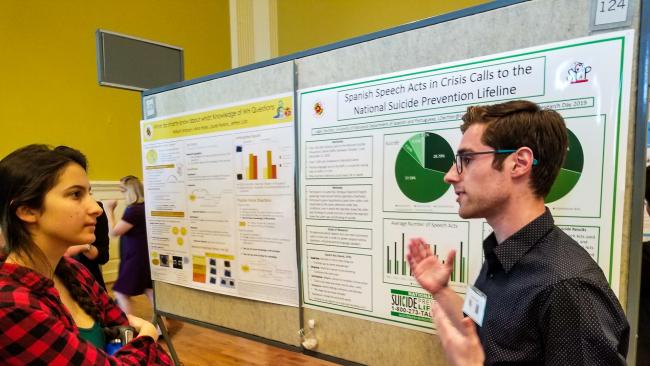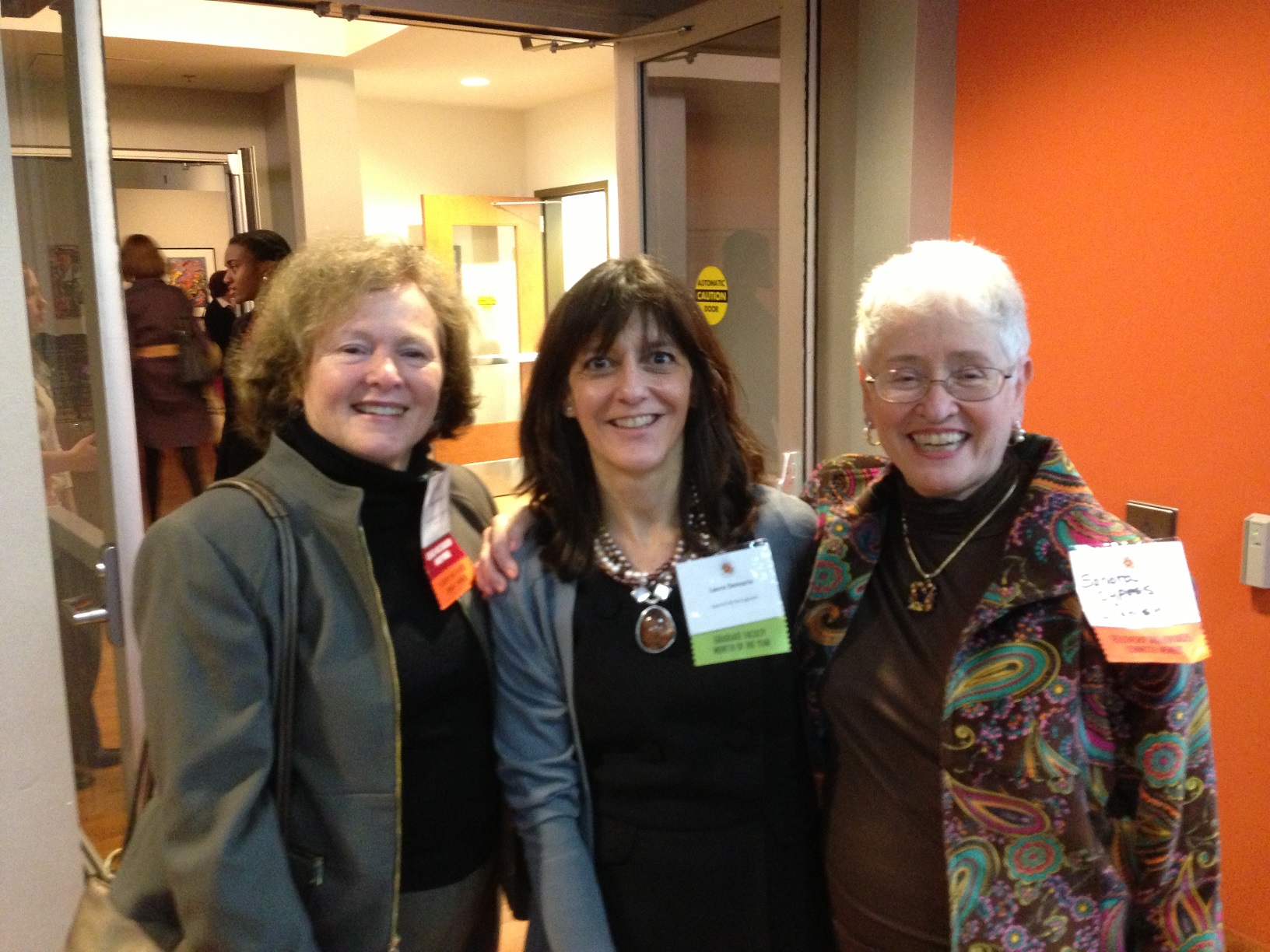Spanish Language and Literature M.A.
The M.A. in Spanish is divided into three areas: Spanish Literature, Latin American Literature and Hispanic Applied Linguistics.
Our graduate programs include an MA degree with three tracks in Spanish Literature and Culture, Latin American Literature and Culture, and Hispanic Applied Linguistics. Our MA students are mentored by faculty, engage in substantive research projects, and benefit from rigorous teaching training. Students graduate from our MA program fully prepared to meet the demands of the current job market and enjoy placement in a variety of professional fields including education, publishing, and translation.
Areas of Specialization

Spanish Literature
Students in Spanish literature and Latin American literature must choose either option as their main area. The student will also select three sub-fields in that area. For example, a student specializing in Latin American literature may choose colonial literature, contemporary literature and indigenous cultures. From these three sub-fields, the student will elect one as his/her focus. The student will also choose an additional (4th) sub-field from his/her secondary area. For instance, the above-mentioned student could choose The Golden Age as the fourth field.

Latin-American Literatures
Students in Spanish literature and Latin American literature must choose either option as their main area. The student will also select three sub-fields in that area. For example, a student specializing in Latin American literature may choose colonial literature, contemporary literature and indigenous cultures. From these three sub-fields, the student will elect one as his/her focus. The student will also choose an additional (4th) sub-field from his/her secondary area. For instance, the above-mentioned student could choose The Golden Age as the fourth field.

Hispanic Applied Linguistics
Students in Hispanic applied linguistics will take required courses in Hispanic applied linguistics and Latin American/Spanish/U.S. Latino(a) literatures, as well as elective courses in several areas.
What can I do with an MA in Spanish?
You will acquire knowledge and skills in Hispanic languages and literatures to:
- Prepare for admission to a doctoral research program leading to the specialized degree of Doctor of Philosophy.
- Teach in secondary schools or community or junior colleges (note that certification from the state is necessary to teach in the public schools).
- Work in fields that require knowledge of Spanish language and cultures such as community outreach, translation, diplomacy, etc.
What do I need to apply?
Degree Admission
The preferred deadline for application as a Degree Seeking Student is January 10 to start in August.
The final deadline for application as a Degree Seeking Student is and January 16 to start in August.
To qualify as a Degree Seeking Student, you must submit:
- online application
- application fee $75
- BA transcripts with 12 or more credits in upper level literature/culture courses (official transcript required upon enrollment during first semester)
- personal statement of purpose
- TOEFL/IELTS/PTE (only international students)
- three letters of recommendation written in English
- CV/resumé
- writing sample in Spanish (e.g., a research paper)
- Apply here
- Step-by-Step Guide to Applying
- English Language Proficiency Requirements for International Students
- Transfer Credits
- Application fee waiver information
Non-Degree Admission
The deadline for application as a Non-Degree Seeking Student is the first day of classes for the semester in which you plan to attend. View the university’s academic calendar to see when each term begins.
To qualify as a Non-Degree Seeking Student, you must submit:
- online application
- application fee $75
- BA transcripts (official transcript required upon enrollment during first semester)
- personal statement of purpose
- TOEFL/IELTS/PTE (only international students)
one of the following:
- a cumulative 3.0 (on a 4 point scale) average for undergraduate level work;
- a master’s, doctoral, or a post-baccalaureate professional degree (MD, JD, DVM, etc.) from a regionally accredited institution;
- a score that places you in the upper 50th percentile of an appropriate national standardized aptitude examination, such as the GRE, GMAT, or Miller Analogies Test;
- a letter of support from the graduate director of the degree program in which you plan to take a course.
Apply here
English Language Proficiency Requirements for International Students
Non-Degree Admissions FAQs
Non-Degree Admissions Checklist
What happens after I apply?
Students on the "short list" may be interviewed by the graduate director in person or by phone.
Please note that funding is limited the Department is able to offer only a few financial packages.
I was admitted to the MA. Now what?
- Read the Graduate Student Handbook
- If you will be teaching as a Teaching Assistant, read the Teaching Handbook
Additional Program Information
M.A. Thesis Procedures
The Graduate School has established criteria for eligibility to present an M.A. thesis as well as deadlines for presentation of the thesis. Information is detailed in the General Forms and Publication Guidelines for Graduate Students.
A student interested in writing an M.A. thesis must seek approval from the graduate committee, ideally in the first half of the second semester. To seek approval, it is advised that the student first approach the DGS.
The M.A. thesis should be about 50 or 60 pages long, not including bibliography.
Required M.A. Comprehensive Examinations
The M.A. examination is given three times a year, in January, May and August, and is based on reading lists for the Spanish, Latin American and Hispanic applied linguistics areas. These lists are periodically revised by the faculty and copies are available online.
Sixty days prior to an examination date, the candidate must inform the director of graduate studies as well as the professor assigned to administer the exam of his/her intention to take the M.A. examination. This notification should be submitted in writing, specifying the main area of the examination as well as the secondary fields.
Incompletes
The grade "I" (incomplete) is given only if the student has experienced an unexpected hardship during the course (e.g., accident, illness, death in the family).
Students who hold a grade of "I" (incomplete) in two courses may be prevented from enrolling in the following semester or from holding a teaching assistantship. Students have a maximum period of one year to complete pending courses; thereafter, the department will change the "I" to an "F." Students who have an incomplete cannot take the comprehensive examinations.
Application for Diploma
Students are responsible for filing an Application for Graduation with the registrar at the beginning of the semester in which the degree is to be conferred. Please consult the Graduate School for deadlines. The department is not responsible for late applications.
Approved Program of Study
Students must meet with the graduate director to approve their program of study for the following semester and must register immediately.
Certification of Completion
The certification of completion for the degree is signed by the student's advisor and the graduate director or by the chair of the department after the student presents the approved program form. The certification is then sent to the Graduate School by the published deadlines for the semester in which the degree is to be conferred.
Time Limit
The student must obtain the M.A. within two years of the beginning of his/her graduate study.
Procedures for MA Comprehensive Examinations
Masters Examination - Spanish and Latin American Literature
This examination is given three times per year, on designated days in January, May and August. The examination is based on reading lists (one for each area), which are prepared and periodically revised by the faculty. Copies may be obtained from the departmental website.
The candidate must notify the director of graduate studies at least 60 days in advance of the examination date that he/she will take the examination. This notification should be submitted in writing and outline the areas in which the student will be examined (three in the major area and the fourth in the minor area).
Should a student fail, he/she may repeat it once.
In conjunction with an advisor, the M.A. student selects four fields of examination; three in the major and one in the minor, or secondary, field.
- Students are examined in all four areas at one of the three scheduled examination dates (January, May and August). The exam will consist of questions submitted to the DGS by the professors who correspond to each area.
- Students who hold a TA appointment and plan to pursue doctoral studies in this department must take the examination in their third semester. Exceptionally, a delay to the fourth semester might be considered.
- Main area of specialization: Students are required to develop a critically informed essay on a question submitted in the main area of specialization.
- Sub-areas of specialization (three): Students are required to develop a critically informed essay on each of the three selected sub-fields (two in the main area of specialization and one in the secondary area of specialization) on questions by corresponding professors.
- Students will take the four exams spanning roughly 20 days (on Friday, Monday, Wednesday and a subsequent Friday) during the dates close to the beginning of the fall and spring semesters and immediately prior to the beginning of the first summer session. The student will work together with the DGS to determine the exact dates.
- Students will receive each question on the same day in which examination will take place at 9:00 a.m. Professors will provide students with two questions from which students will pick one and then students will have four hours before the exam to brainstorm, prepare, gather quotes, organize thoughts, etc. Each exam will last four hours from 1:00 p.m. until 5:00 p.m. The student will write the answer in Spanish in a room provided by the department staff. No notes or bibliography may be consulted, although the use of a language dictionary is permitted.
- Secondary field of specialization: It will be based on a comprehensive list of texts for either Latin American (from the olonial period to the 20th century) or Spanish (Medieval period to the 20th century) literature.
- Students will take exams in fields/areas explored in previous classes and with professors who have supervised the student’s work in such fields. It is required that students meet with the professor responsible for each field/area prior to the exam (a) to review the list of required texts for the specific field, and (b) to confirm the date of examination.
- Evaluation:
- After reading the written examinations, a committee of departmental faculty members will evaluate the student's progress toward the granting of the M.A. degree.
- The director of graduate studies will notify the student of the results, in writing, within two months of taking the first examination.
- Students who fail the examination(s) will have the option of retaking the failed examination(s) only once.
M.A. Exam for Students Who Write a Thesis
Students whose option to write a thesis has been approved by the graduate committee will take a modified form of the exam. It will consist of two questions, to be distributed and answered in the same fashion as the normal, non-thesis exam. The exam will take place during one week, on a Monday and a Wednesday, the dates to be determined in the same fashion as the normal, non-thesis exam. One question will be from the major field, but from a different sub-field from the sub-field corresponding with the thesis topic. For example, if a thesis is about 20th-century Latin America, the M.A. exam question will be from a sub-field that is not 20th-century, for example colonial or 19th-century. The second question will be from the secondary, or minor, field. In the case of a student who writes a thesis about Latin America, for example, the second question would be about peninsular literature.
Hispanic Applied Linguistics
This examination is given three times per year, on designated days in January, May and August. The examination is based on reading lists (one for each area), which are prepared and periodically revised by the faculty. Copies may be obtained from the departmental website.
The candidate must notify the director of graduate studies at least 60 days in advance of the examination date that he/she will take the examination. This notification should be submitted in writing and outline the areas in which the student will be examined (the major area, Hispanic Applied Linguistics, and the minor area, Latin American/Spanish/Latino(a) literatures and cultures).
Should a student fail, he/she may repeat it once.
- Students are examined in the two areas at one of the three scheduled examination dates (January, May and August).
- Students will take the exams in only one week (on Monday and Friday) during the dates close to the beginning of the fall and spring semesters or immediately prior to the beginning of the first summer session. The professor in charge will determine the exact dates.
- Students will receive each question on the same day in which examination will take place. Professors will provide students with three questions from which students will pick two. Each exam will last three hours. The two exams can be taken on the same day (one in the morning and one in the afternoon) or on two different days during the same week. The student will write the answer in Spanish in a room provided by the department staff. No notes or bibliography may be consulted, although the use of a language dictionary is permitted.
- Students will take exams in fields/areas explored in previous classes and with professors who have supervised the student’s work in such fields.
- Evaluation:
- After reading the written examinations and the main area essay, a committee of departmental faculty members will evaluate the student's progress toward the granting of the M.A. degree.
- The director of graduate studies will notify the student of the results, in writing, within two months of taking the examination.
- Students who fail the examination(s) will have the option of retaking the failed examination(s) only once.
Graduate Student Handbook
The purpose of the Graduate Student Handbook is to aid you in understanding the context of graduate education at UMD. The goal is to provide you with resources, information, practices, and policies that will help you in navigating the graduate experience.
Teaching Handbook
The Teaching Handbook is intended to familiarize graduate students with the procedures, policies, and expectations in teaching, research and administrative environments as an integral part of their education.


